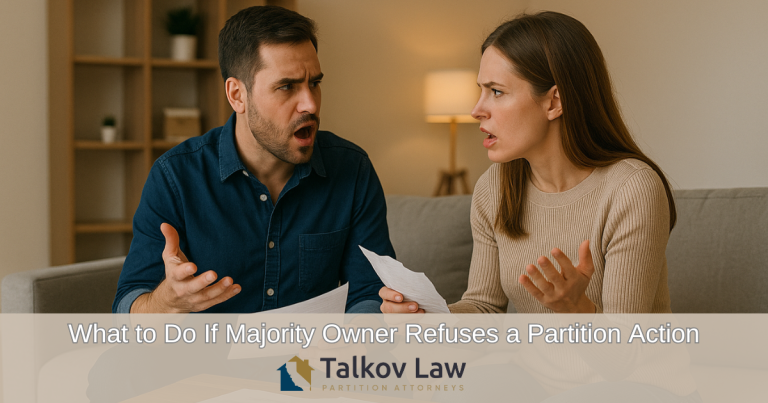When the majority owner refuses a partition action, you don’t have to stay trapped—California law is on your side.
When co-owners of real estate don’t see eye to eye, disputes are inevitable—especially when one party wants to sell, but the majority owner(s) disagrees. Fortunately, California law provides a clear legal path forward for minority owners through a partition action.
Even if you’re not the majority owner, you still have the legal right to force the sale of the property and recover your fair share.
You Don’t Need Majority Permission to File a Partition Action
Under California Code of Civil Procedure § 872.210, any co-owner—regardless of how small their ownership share may be—can initiate a partition action. Whether you inherited a fractional interest, bought into an investment property, or co-own a family home, the law doesn’t require unanimous consent to divide or sell.
Why Majority Owners Oppose Partition
Majority owners may resist partition for reasons like:
- Living in the home rent-free
- Emotional attachment to the property
- Anticipating future appreciation
- Disputing ownership shares or reimbursement claims
While these concerns may be understandable, they don’t override your legal right to exit co-ownership and access your share of the equity.
What Happens When You File Anyway?
Even if the majority owner objects, the court can:
- Confirm each party’s ownership interest
- Appoint a neutral partition referee to oversee the sale
- Order the property sold or divided
- Allocate proceeds fairly, considering ownership shares and contributions (e.g., mortgage payments, improvements)
Their refusal may slow things down, but it won’t stop the process. With the right legal guidance, you can move forward confidently.
Minority Owners May be Entitled to Collect the Majority of Their Legal Fees
Partition law creates a special protection for minority owners when majority owners are unreasonable. Notably, each co-owner is by default liable for their ownership percentage of the legal fees in the action. Specifically, Code of Civil Procedure 874.040 provides that “the court shall apportion the costs of partition among the parties in proportion to their interests or make such other apportionment as may be equitable.” For example, this means that a 10% owner may ultimately collect 90% of their legal fees from the other co-owner(s) of the property. The result is that majority should be very careful to respect the rights of minority owners.
Legal Guidance Is Key
Partition actions involving uncooperative majority owners often come with extra complications—disputes over valuation, exclusive possession, or reimbursement claims. An experienced partition attorney can ensure your rights are protected and your financial interests are prioritized.
Talkov Law: The Firm California Co-Owners Trust
Luckily for minority owners, the ownership share is irrelevant in a partition action. All that is required is any co-ownership interest in the property.
At Talkov Law Partition Attorneys, we specialize exclusively in partition actions—helping minority owners stand up for their rights and force sales when negotiations break down. With twelve full-time partition lawyers and over cases handled statewide, we’ve built an unmatched reputation for resolving even the toughest co-ownership disputes.
Don’t let a majority owner’s refusal leave your property and finances in limbo. Call (844) 4-TALKOV or contact us online to schedule a free consultation today.







































































































































